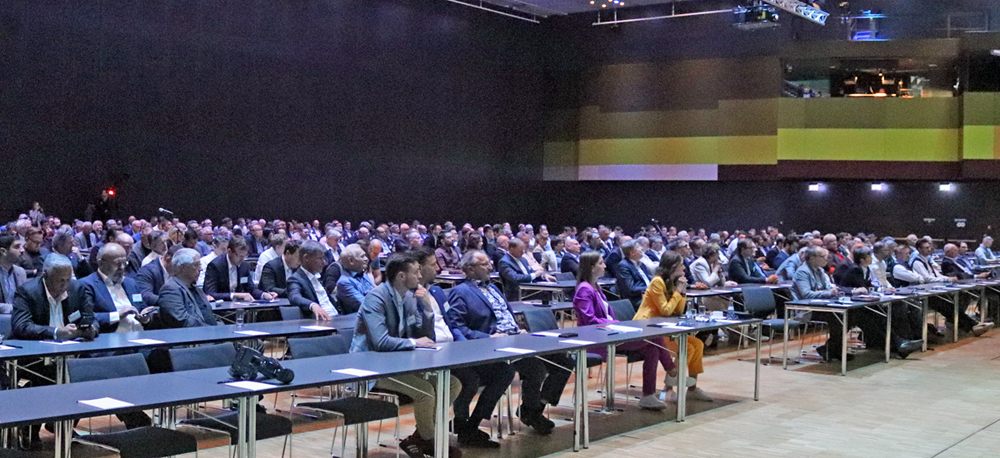The motto already made it clear that it is almost like squaring the circle to get to the heart of the current challenges. “Pioneering Industrial Digital Transformation for Sustainable Systems” should mean: Digitalization and systems engineering must not only be driven forward with all consistency, but also in a way that includes comprehensive solutions for sustainability on the part of industry.

The plenary session at the opening (photo Sendler)
The symposium remains the most important event for experts in the digitalization of industrial processes with many years of experience in the use and development of software to meet and exchange ideas. Starting with the major corporations in the automotive and aircraft manufacturing industries, the community has long included numerous companies not only from their supplier industries, but also from mechanical engineering and other sectors of the manufacturing and process industries.
Hot debates about AI in industry
The focus has long since shifted from the use of engineering software up to comprehensive PLM strategies, and includes now also numerous other topics that the industry is increasingly confronted with. A very recent example is AI, which in recent months has not only penetrated people’s private lives via ChatGPT from OpenAI, but precisely also into rather conservatively functioning areas such as industry.
Away from the three main halls of the event at the ECS at Messe Stuttgart, there were more interested parties in a smaller room on the afternoon of the first day than the 80 chairs available. Many participants stood all around the walls during the discussion on “AI for Intelligent Engineering,” and most stayed for nearly an hour instead of the planned 35 minutes.
With impulse statements (pictured right): Prof. Rainer Stark, member of the association’s board and professor at TU Berlin, Prof. Lydia Kaiser, also TU Berlin, and Marcus Goerke, industrial AI entrepreneur and founder of the startup NextMO.

The best ideas come from smaller group debates (photo Sendler)
What they all had in common was a great desire not to meet the new possibilities of the latest AI developments with rejection, but to explore and use them where this is promising. The result of this Expert Corner: at the evening event, Rainer Stark called on the members of the association to provide industry data for AI research, while the association had to guarantee the security and protection of the data.
This was a good example of how this new format with a panel and smaller audience can bring life to the event and the association. In contrast, the two Expert Corners organized in the main hall were more examples of unidirectional stage talk shows. Smaller rooms, burning issues, short impulses, then the joint elaboration of important initiatives runs as if by itself.
New formats for new ideas
The prostep association will soon report on the many presentations in its product data journal. The large number of presentations makes it almost impossible to give an overview. However, one remark is allowed: The practice of sponsor keynotes, which has been practiced at the symposium for many years as at other major events, this year by the main sponsors Volkswagen and Siemens Digital Industries Software, appears more and more as a model that should not be continued.
Those who expected to hear something concrete from Thomas Kamla and Abdallah Shanti from VW about the much-discussed new approaches to the role of software in the vehicle and in the group were disappointed. And even what was said was to prove beside the point just a few days later, when VW’s board announced it was replacing its CARIAD leadership team and redefining its goals.
The keynote by Joe Bohman from Siemens at the beginning of the symposium also left even some Siemens employees with a question mark as to what the integration and merging of IT and OT should look like in practice in concrete terms.
As in the early days of the association, the new ideas are in the minds of the members. This was also demonstrated by another new format. At the end of the first day, four startups presented themselves for an elevator pitch. They had exactly 3 minutes to present their company and its offering to the auditorium. All four managed to say what was important in this short time. The Spread GmbH from Berlin then digitally got the nod from the audience and the Startup Award from the association.
The prostep ivip Symposium remains the most important event for everyone involved in industrial software. And even after 30 years, the association obviously has good ideas for new approaches. The industry urgently needs them.

Dr. Christian Wienss, Head of Sales, Spread GmbH, accepts the Startup Award. (Photo Sendler)
